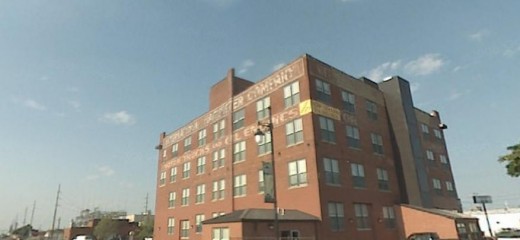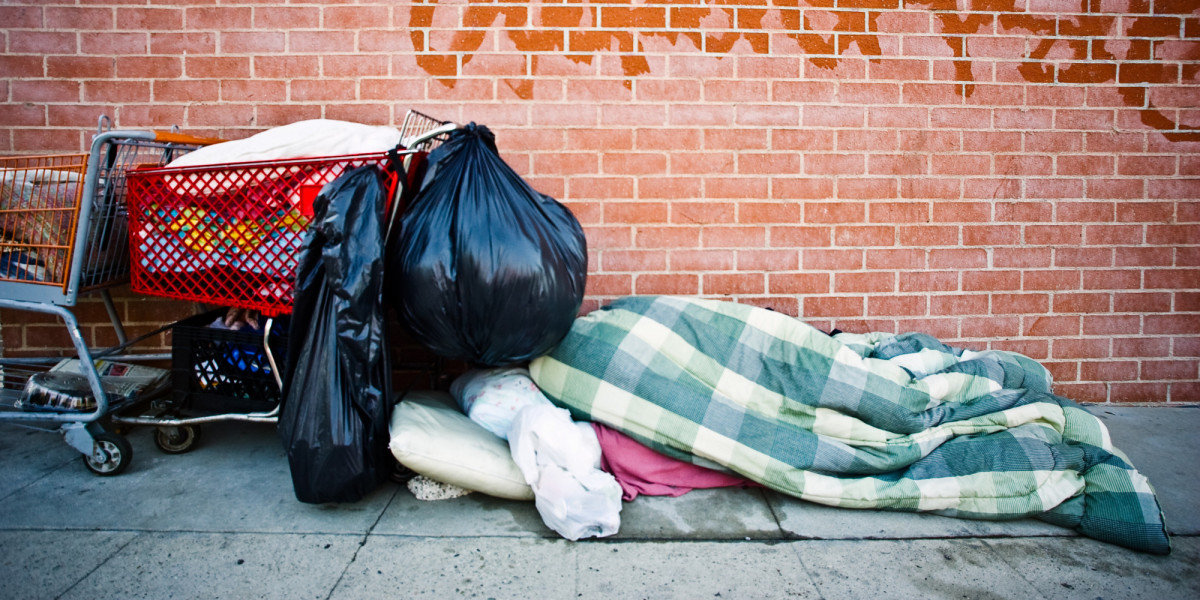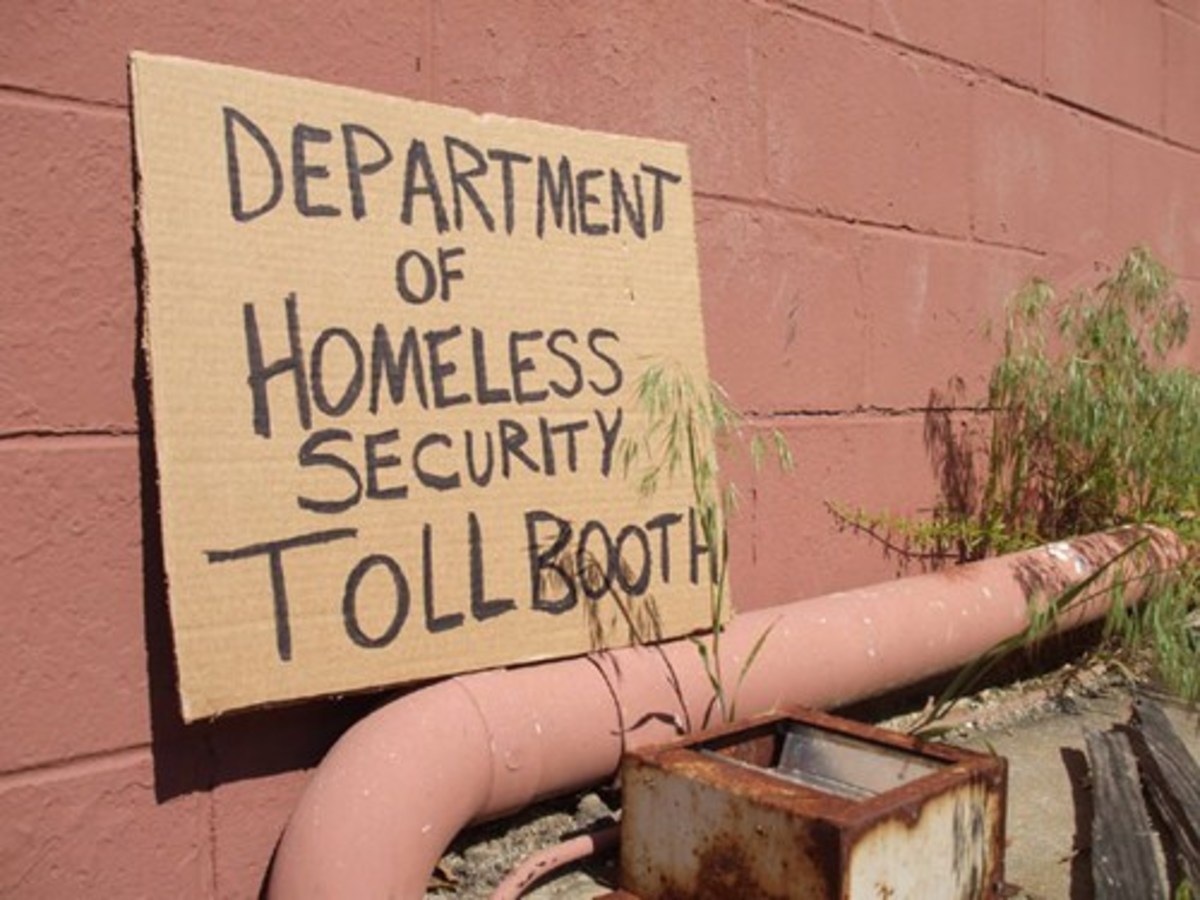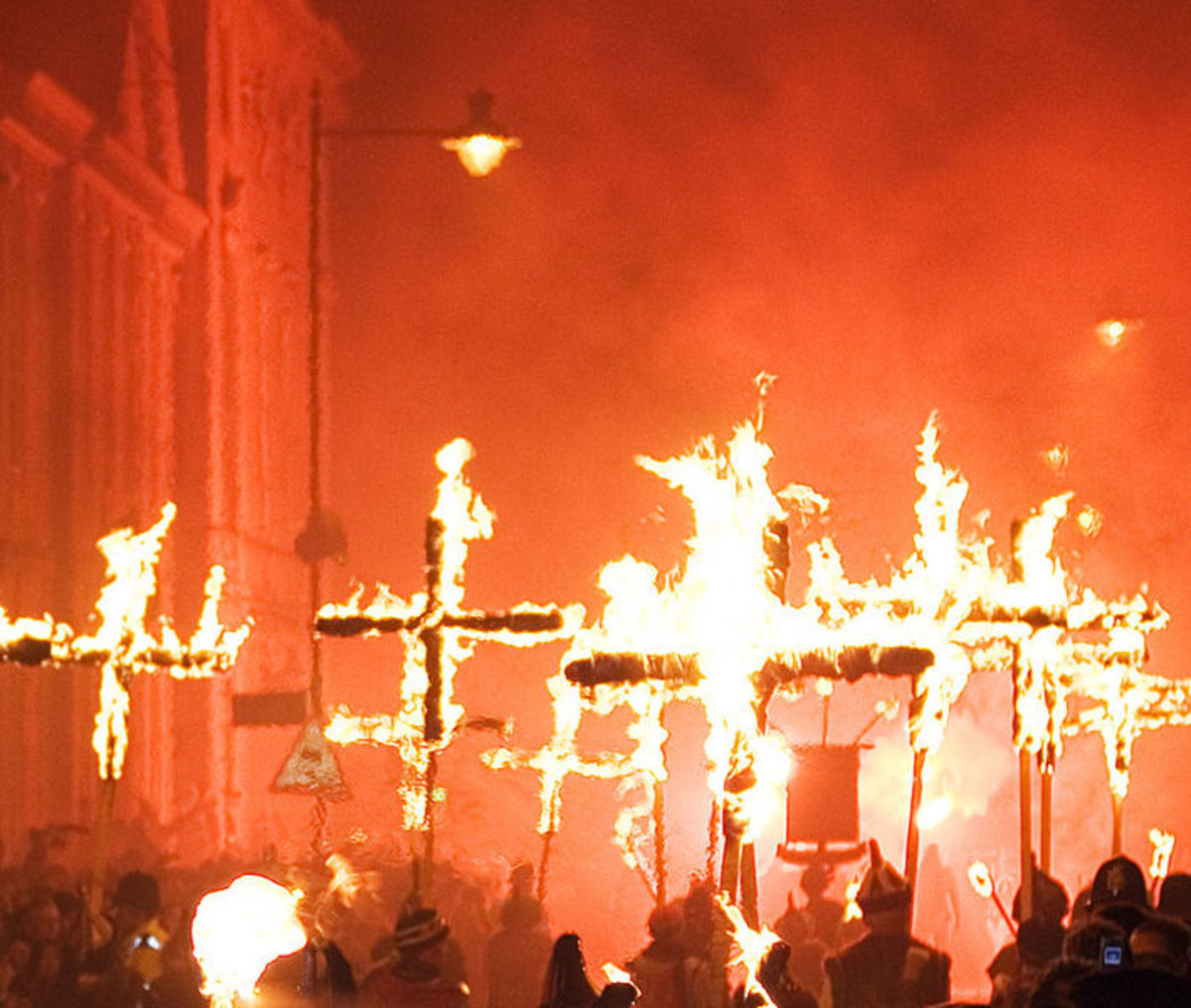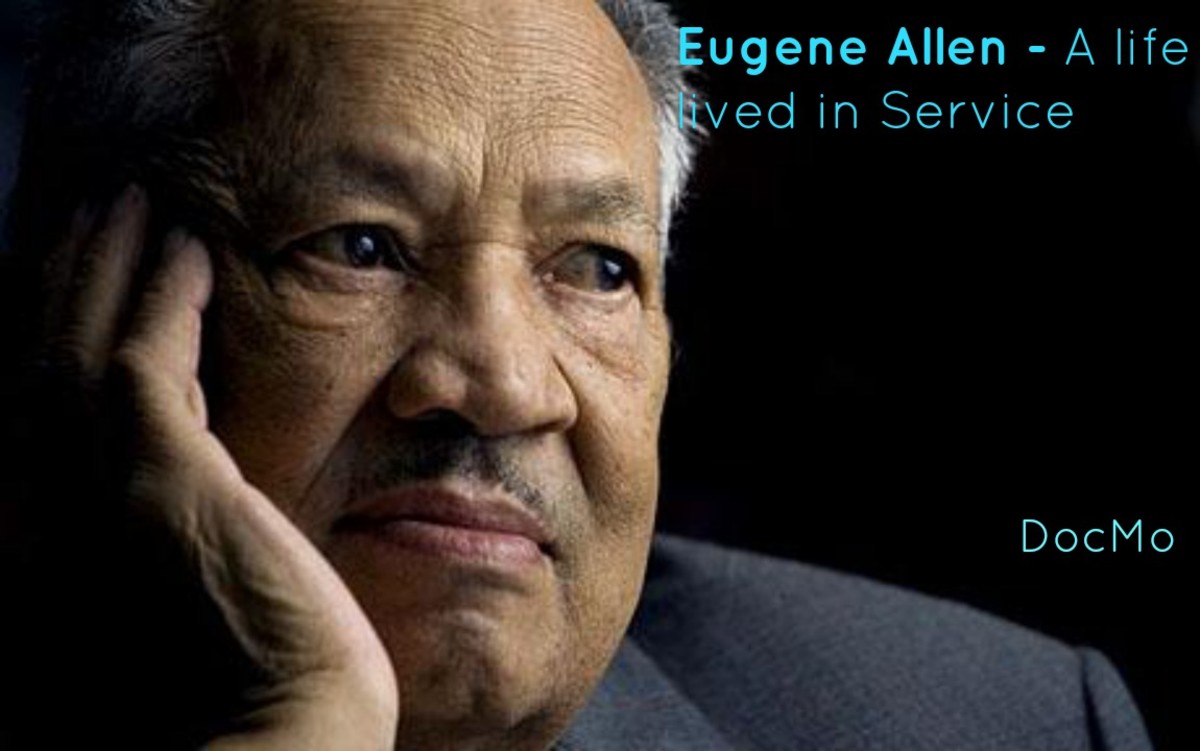Unintentionally Homeless, Family on the Streets
Food, Shelter, and Clothing
I probably grew up in a somewhat sheltered environment, but rural Kansas farm country didn't have a problem with homelessness. Among the mile after mile of green pastures mingled with wheat, sorghum, soybean, and alfalfa fields, everyone who lived there lived in a house. Having a few acres of land and a farmstead usually met a farmer could feed, clothe and put a roof over his family's heads all the time. They might not have much money for extras or luxuries, but they had the basics covered. I had to grow up and become a city dweller before I was able to see this situation for what it really was.
Sometime after high school, I found myself in Emporia, Kansas, working at a meat packing plant. As wages ran back then, it was probably the best paying job in town, and I grew to like the "city life." Of course Emporia hardly qualifies as a city, but it offered a lot of amenities that weren't readily available to people living an hour's drive away. Getting off the farm was an enlightening and pleasant experience, but there was a trade off that lifelong urbanites don't understand. I have cousins in the Kansas City area who have lived there all their lives. Their parents, my aunts and uncles all grew up as farm children and moved away as part of the mass post World War II exodus. Once there, they discovered high paying jobs at the automotive plants and achieved a standard of living we poorer folks could only envy. But the trade off was that like many people today, they were only one or two paychecks away from hard times. Strikes called by the automotive worker's unions hit them pretty hard over the years. On the other hand, my mom and dad were pretty well set to survive for a few months to possibly a year in case a major drought caused the crops to fail, or disease decimated our cattle herd. They were able to do this because they owned a farm.
Now, Emporia probably had some people who had no permanent place to stay but I never saw any signs of it. I never knew of any shelters when I lived there, although it's possible they existed behind the scenes somewhere. Maybe I just wasn't looking in the right direction. But then during the mid eighties, my employer offered me a non-negotiable transfer to Wichita. I reluctantly accepted it, not knowing the changes I was about to experience.
Kansas Crops
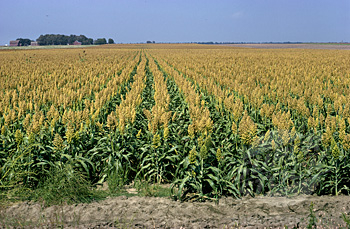
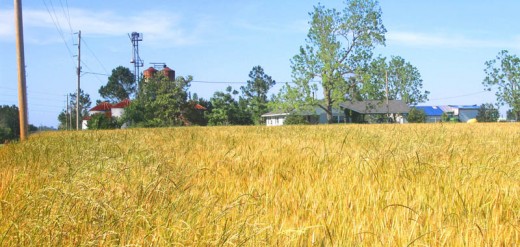
Wichita, KS
When I relocated to Wichita, I knew practically nothing about the town. It's the largest city in the state and also a huge economic hub. Years ago, with the creation of Cessna Aircraft and Beech, Wichita was nicknamed the "Air Capitol of the World." In addition, Boeing had a large facility there, and Lear located near the airport later on. But airplanes weren't the only game in town. Oil drilling and well servicing were big, as was different food processors. And a number of smaller specialty manufactures call the town their home too. Most of these have nationwide recognition within their spheres of influence. And then of course, there were other businesses whose purpose was to provide goods and services to the manufacturing base.
This wide range of manufacturing caused an equally wide range of pay scales, and building airplanes was at the apex. It wasn't unusual for as many as fifteen thousand employees to be working at the aircraft plants even during less than stellar economic times. The effect on the town was huge. Real estate and rental prices were set by the high wages these workers earned, and a gap existed in the availability of housing. Those earning high wages were able to afford nicer homes with more features and greater comfort. Lower paid workers then were forced to take less desirable properties, usually in poorer neighborhoods. Sadly, when one calculated the added expenses due to higher insurance costs, higher utility bills resulting from poorly insulated houses, and increased costs from driving longer distances to work or shop, it was found that housing cost the poor man as much as it did the wealthier. During most of my time in Wichita, I worked for wages well below those of the aircraft workers.
Wichita City Center
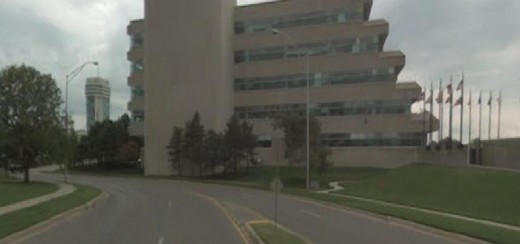
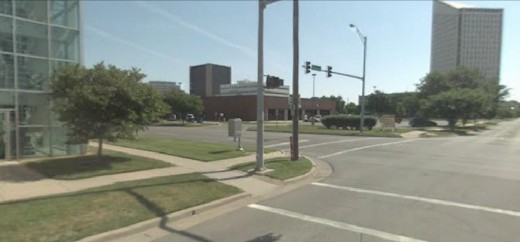
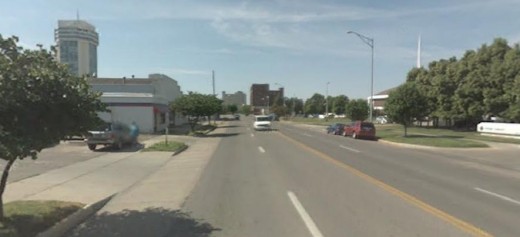
Wichita in depth
To simply drive through Wichita from any direction, on the freeways, you will see a clean well kept city. A lot of newer modern construction lends to this impression but like any larger town, there are areas unseen by the casual traveler. Driving through the city's streets with a co-worker who was showing me around, I for the first time got a glimpse of some of urbanity's social ills. On one corner, a group of three or four women stood chatting, and he pointed them out as probable prostitutes. Nearly everywhere we went, we could see scruffy shabbily dressed men walking the sidewalks and he referred to them as bums. I learned later than the "bums" were homeless men. It's difficult to imagine the plight of some of these people, and sometimes even more difficult to feel empathy for them. For the most part, they were a minor source of humor and crude jokes where my fellow employees were concerned. But my attitude was forever changed one evening as my family and I drove through the downtown area. For a number of years, I had been blissfully unaware of the existence of people who had no place to live. Then upon moving to Wichita, I abruptly learned there were some in this plight, but all the ones I had seen were older men, likely having problems with alcohol, or drugs. Then occasionally, we would see a bag lady. The homeless had an appearance all their own. Shabby clothes, unkempt hair, sometimes pushing a shopping cart, or carrying some sort of a bundle. But the look in their eyes was the worst. It epitomized the lack of hope and the excess of fear and distrust that made them recognizable. Usually the poor souls suffering this condition would not meet the gaze of another person, and if they did they were looking for some indication that maybe that person was generous enough to part with some pocket change. Enough time spent downtown and one could learn all the primary hangouts, and how to avoid them when one's sensitivities were incapable of dealing with the down-on-their-luck types. It was that evening not far from where I worked, that we first saw the family.
My wife noticed them before I did. A young couple pushing a baby stroller aimlessly down the street. A casual observer probably would have not seen the signs that these people had no place to live. After all, parents and two small children are not unusual. One would have to note that the stroller was not used just to transport a small child, but that it was loaded with numerous items like blankets, and clothing and things that people don't carry around with them if they have a home. A closer look revealed the clothes they were wearing were out of character from what their contemporaries would have had on. Sadly, although in most cases donated clothes are perfectly serviceable, and enough to keep a person warm, it seems styles change rapidly enough that items only a few years old become moribund. And in an age where clothes "make the individual" and first impressions are the most important, then someone dressed as these people were that night would definitely place them lower on the social scale than someone who could afford newer clothes. It was hard to see the need in that family and not be able to extend a helping hand.
Douglas Street looking east.
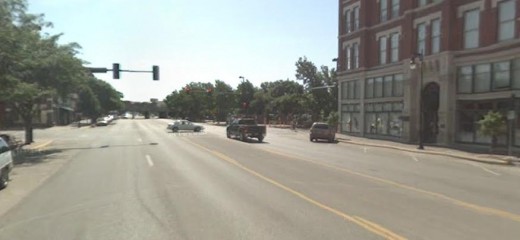
Wichita Public Library
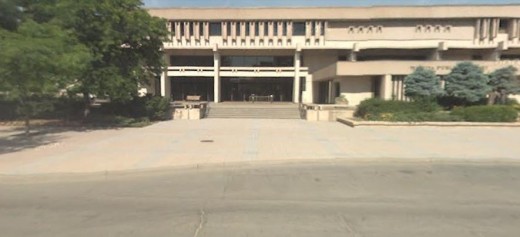
Major intersection on busy street
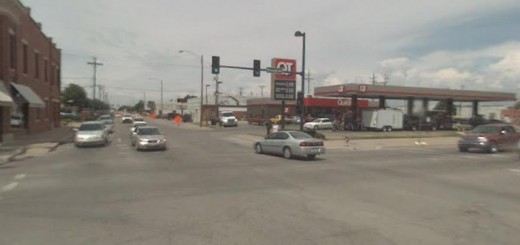
A closer look
As disheartening as it was to see a young family with as little means as they had that evening, it was a few years later that it really struck home to me. We moved out of Wichita on a whim and a promise, and then when the promise failed, had to move back. Financially we were barely afloat and a missed paycheck could have been disastrous for us. I caught a couple of part-time jobs to give us a little breathing room in case we needed it, and then someone told me about the people who "donate" plasma. I say "donate" because the plasma centers compensated donors around twenty dollars per donation at that time. They even advertised in the "Help Wanted" ads in the local newspaper. Some donors went in five or six times a month and made as much as a minimum wage part time shift would have offered and they simply lay on a bed watching television. And for convenience, there was a check cashing place next door. I found the idea a little repugnant, but every dollar I could earn helped so I went there a few times.
Now I really didn't like getting stuck with a needle, and I didn't care for laying on a bed watching some program that had been picked out by the majority of donors so I lost interest pretty quick. But a few months later, the need arose again so I went back. Since I had been gone for what they considered a long time, I had to go through some health screening again, and while I was waiting for the results, I took a seat in the waiting area. I am by nature a people watcher. I find it a learning experience to observe the pubic going about the task of being themselves. It probably wouldn't be as acceptable in New York City, but in Wichita, nobody seemed to care much. I sat there in the chair observing the patrons coming and going, taking what I could from their appearance and demeanor and speculating about their lives and how they lived them. In some ways it's a study in sociology, and most of what I see is quickly forgotten, but sometimes something happens that firmly fixes itself in memory, and that evening was one of those times.
A plasma center
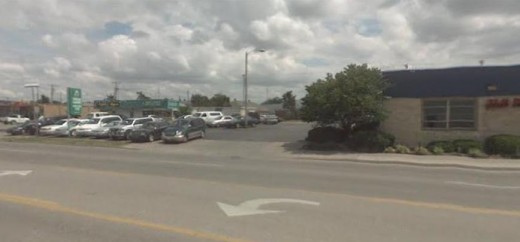
Former donation center
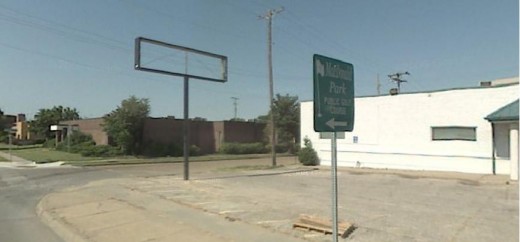
Another family in need
As I sat there that evening, I noted through the front windows it was dark outside. I don't remember the exact month, but I do remember it was cold as well. Maybe not as cold as that part of the country is known to get at times, but still not a good night to be outdoors trying to sleep. I watched idly as a custodian swept the floor in the entry way, and then experienced a moment of amusement when she donned a pair of safety goggles before she sprayed window cleaner on the glass. At about that time a family walked in, and at a glance I could tell they were down on their luck.
The dad appeared to be late twenties, or possibly early thirties and the mother maybe a bit younger. He was dressed in worn clothing with a winter coat and a hat of sorts. His hair was long and not well kept. His face was covered with a beard. She was similarly dressed, and although their clothes were not the best, the whole family seemed to be clean. Then I noticed the kids. There were two sons, the older being thirteen to fifteen and the younger looked around ten or so. They were both dressed in obviously second or third hand clothing. The younger didn't seem too taken aback by their situation, but the older of the two made me take notice.
They had come inside, but not to donate for money, or at least not at that moment. The man went to a pay phone on the wall and rummaged in his pocket for some change. He had a paper or something with a phone number on it and obviously intended to make a call. I considered then, at that hour of the evening, and knowing the downtown area had a very limited number of business that stayed open beyond 5:00 pm, he was probably using one of the closest phones available, and apparently didn't have one at home or wherever he lived. The younger son sort of milled around as boys of that age do, looking at one thing or another, feeling the texture of the wall and so forth, but the older boy stood in one place with his hands held politely together just below his belly. He was dressed in a pair of plaid slacks that had gone out of style before he had been born. His shoes were worn and tattered, and his coat had seen better days. He wore no hat, and his hair, a little too long formed curls on the side of his head. He stood without moving, his hands clasped together, and a half smile on his face. He had the look of someone trying not to be noticed and I could only speculate on what he must have been thinking or feeling.
The man finished his phone call, of which I hadn't heard a word, and then turned to his wife. They spoke and although I am an observer, I am not an eavesdropper, and made no effort to listen in. Then he made a comment loud enough it couldn't be ignored. The words he spoke were something to the effect that if he could get "that car" then something else would work out as well. And then it struck me again. I had a car, and yes it was sometimes difficult to get the payments in on time, but I still had a car, and was in no fear of losing it. So that being said, I probably tended to take my car for granted. This family on the other hand were at a stage of trying to pull themselves up, that future success may well have depended on whether the guy was able to swing a deal on "that car."
I walked out of the center that night and don't recall ever going back. I think I probably found a normal part time job after that. But I've wondered at times since then how things turned out for that family. The gentleman looked like any other Wichita working man in any number of the plants in town except for his clothing. I wonder, did he get the car? Were they living in a shelter at the time, or did they need the car to live in as well. Was he able to find a job maybe as a highly paid aircraft worker and move his family into a comfortable home somewhere? Did the older boy recover some of his pride and self-esteem? Did he maybe go out for sports in school? And how about the younger son? Did he become part of a circle of friends enjoying the most carefree part of their lives? I hope so. It's been enough years ago that the older one would probably be about the same age his father was that night. Is his life better? Are the parents still married or did their problems cause them to divorce? I'll never know of course. But now when I am driving down the road and see a poorly dressed individual standing on a street corner holding a sign, I look at him a little differently. Sometimes I even pass him a dollar if I have one in my wallet in these days of plastic cards. And when my wife comes home and tells me about a co-worker that has a lot of clothes in her car and carries an oversize flashlight in her purse, I wonder. Is she just unorganized, or is she another victim of an economy that cannot promise shelter to everyone. Then I look at the ceiling over my head and give thanks.
Warehouse sector
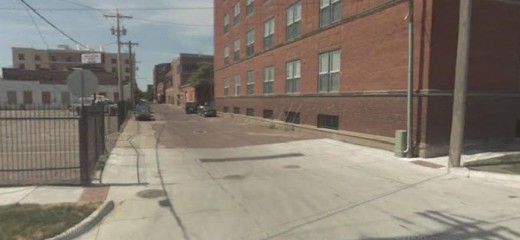
Old factory, new hotel
